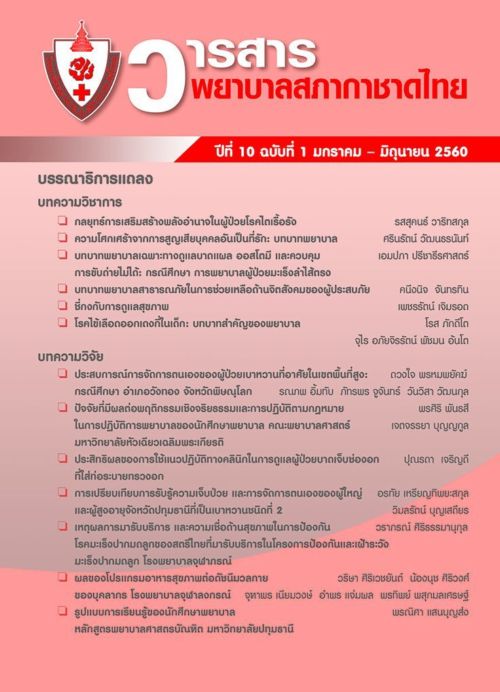ประสบการณ์การจัดการตนเองของผู้ป่วยเบาหวานที่อาศัยในเขตพื้นที่สูง: กรณีศึกษา อำเภอวังทอง จังหวัดพิษณุโลก
Keywords:
พฤติกรรมการจัดการตนเอง, ผู้ป่วยเบาหวาน, พื้นที่สูง, self-management behaviors, diabetes patients, highland areasAbstract
การศึกษาครั้งนี้เป็นการวิจัยเชิงคุณภาพ เพื่อศึกษาประสบการณ์การจัดการตนเองของผู้ป่วยเบาหวานที่อาศัยในเขตพื้นที่สูง อำเภอวังทอง จังหวัดพิษณุโลก เก็บรวบรวมข้อมูลโดยการสัมภาษณ์แบบเจาะลึก ผู้ให้ข้อมูลจำนวน 33 ราย โดยสัมภาษณ์ตามเกณฑ์การคัดเลือกผู้เข้าร่วมวิจัย วิเคราะห์ข้อมูลตามแนวคิดของจีออจี (Giogi’s method) ผลการวิจัยพบว่า 1) การตั้งเป้าหมายในการอยู่ร่วมกับโรคเบาหวาน คือ การควบคุมระดับน้ำตาลในเลือดไม่เกินเกณฑ์จากการกลัวการเปลี่ยนแปลงการรักษาและเพื่อให้ชีวิตยืนยาวเพื่อคนที่รัก 2) การรวบรวมข้อมูลในการจัดการตนเองจากเจ้าหน้าที่สาธารณสุขและผู้ป่วยด้วยกันเอง ญาติพี่น้อง 3) การตัดสินใจในการปฏิบัติจากการรับรู้ว่าเป็นประโยชน์และโทษต่อตัวเองและปฏิบัติได้ง่ายสะดวก 4) การลงมือปฏิบัติ โดยการใช้ชีวิตให้เป็นปกติวิถีชีวิตพื้นบ้าน และการปฏิบัติตามคำแนะนำบุคลากรทางสาธารณสุข 5) การสะท้อนกลับข้อมูล จากการประเมินค่าระดับน้ำตาลในเลือด และการสังเกตอาการของตนเอง 6) ปัจจัยแห่งความสำเร็จในการการจัดการตนเองขึ้นอยู่กับ ความสามารถในการกำกับตนเองและการจัดแยกอาหารของตนเอง
ข้อเสนอแนะในการนำผลการวิจัยไปใช้ ควรมีการส่งเสริมการจัดการตนเองของผู้ป่วยเบาหวานที่เหมาะสมกับบริบทวิถีชีวิตพื้นบ้าน
Self-Management Experience of Diabetes Patients Living in Highland Areas: A Case Study in Wang Thong District, Phitsanulok Province
The purpose of this qualitative research was to explore the experience of self-management among diabetes patients living in highland areas of Wang Thong District, Phitsanulok province. Data were collected through in-depth interviews with 33 selected participants. Data were analyzed by Giogi's method. The results of the study showed that: 1) setting the goal of living with diabetes to control blood sugar levels due to fear of treatment change and wanting to live longer for their lovers; 2) gathering information about diabetes from health care providers, other diabetes patients, and their family members; 3) deciding on the practice from perception about the benefits and risks and which is easy to implement; 4) implementing by living with normal life folk, and following the advice of health care providers; 5) reflection by evaluating the levels of blood sugar and assessing their symptoms; 6) key success factors in self-management depending on self-control and preparing their own diet.
The suggestions from this study are health care providers should promote the easy self-management of diabetes patients appropriate to the lifestyle context.
Downloads
Issue
Section
License
เนื้อหาบทความหรือข้อคิดเห็นต่างๆ ในวารสารพยาบาลสภากาชาดไทยนี้ เป็นความคิดเห็นของผู้เขียนบทความ ไม่ใช่ความเห็นของกองบรรณาธิการ หรือสถาบันการพยาบาลศรีสวรินทิรา สภากาชาดไทย






